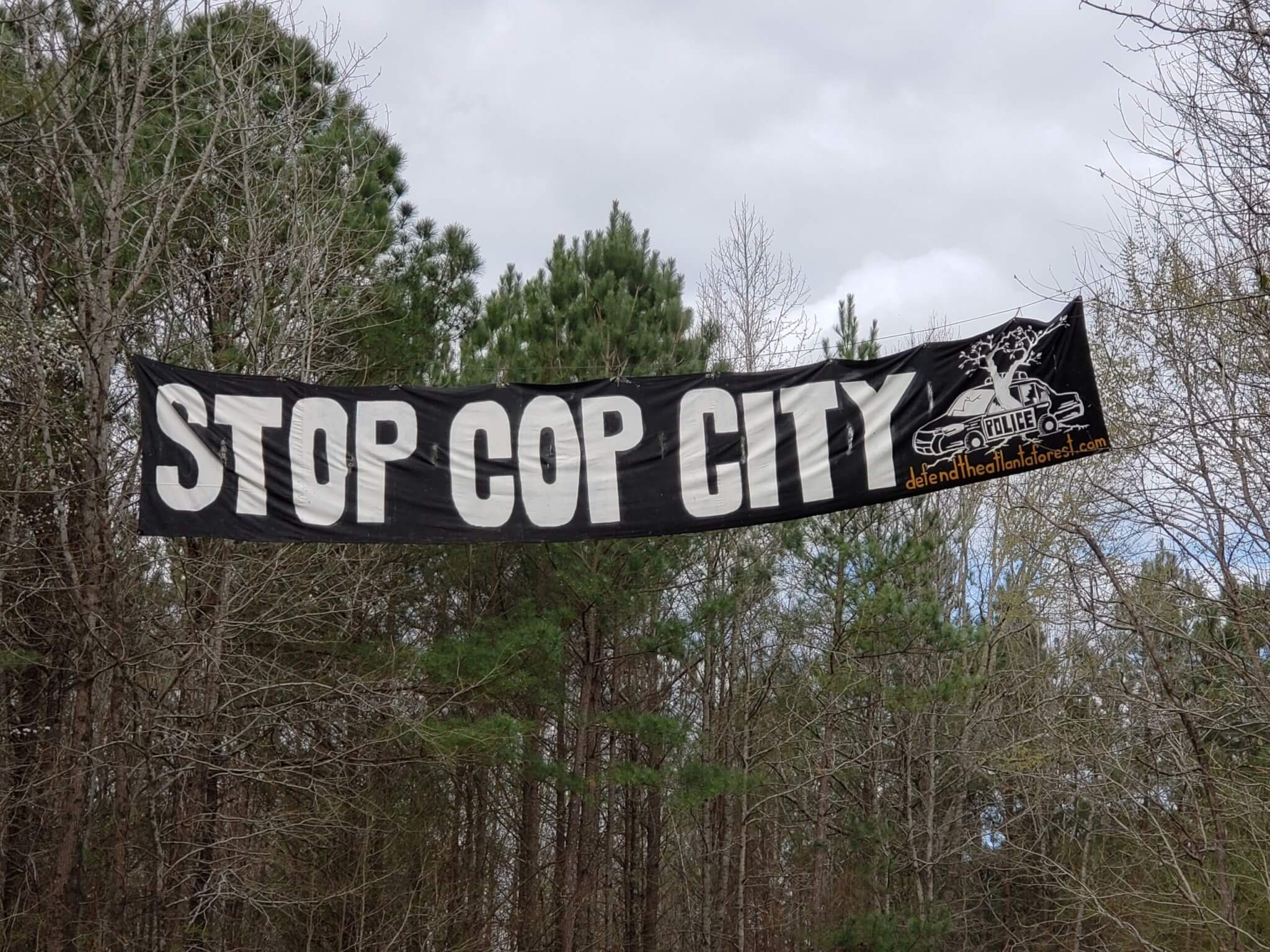For Cop City: 4; Against Cop City: 124.
This was the tally taken at a public hearing on June 6 in Atlanta City Hall over the new Atlanta Public Safety Training Center: a $90 million, 85-acre campus for police, firefighters, and paramedics informally known as “Cop City.” That day, over 1,000 protesters arrived at Atlanta’s City Hall during a public hearing to decide if taxpayers should finance the project. Hundreds of protesters occupied the building’s cavernous inner chambers where the meeting was held while hundreds more staged a rally outside. “Stop Cop City!” and “Cop City will never be built!” echoed throughout the surrounding neighborhood.
The Atlanta City Council, mostly Democrats, voted 11-4 in favor of approving $31 million for the training facility. The city council also guaranteed that Atlanta taxpayers will spend another $1.2 million annually for 30 years to cover the Atlanta Police Foundation’s debt they assumed to build it. Atlanta Mayor Andre Dickens called the vote a “major milestone.” He also said that “Atlanta will be a national model for police reform with the most progressive training and curriculum in the country.”
In opposition, Atlanta City Councilmember Keisha Waites was one of the four elected officials to vote NO for Cop City. Waites’s press release about the matter states that her “no vote is in no way a reflection of [her] lack of support for the law enforcement community.” The text later criticizes the project for its lack of transparency and noted its total cost for taxpayers may be closer to $67 million. Georgia Senators Raphael Warnock and Jon Ossoff were largely quiet about Cop City until the Atlanta City Council hearing. Both have since made public statements that offer loose support of protesters without making any clear stand for or against Cop City.

While Atlanta teems with frustration, the debacle itself went largely unnoticed in mainstream circles throughout the U.S. until last winter. Public anger reached a boiling point over Cop City on January 18, when 26-year old environmental activist Manuel “Tortuguita” Terán was shot 57 times by George state patrol officers in Weelaunee Forest, where Cop City is set for construction. The police killing at Cop City came two years after Rayshard Brooks, a 27-year old Black man, was shot twice in the back by Atlanta police, and one month after George Floyd was murdered by Derek Chauvin in Minneapolis. While Chauvin was prosecuted, the white Atlanta police officers who murdered Brooks were acquitted in August 2022. In light of these killings, the decision to invest $31 million in policing further polarized an already outraged populace that wants to see tax dollars go toward more community-oriented uses.
“There’s not a lot of evidence that shows more police keeps cities safer,” said Jordan Jones, an organizer for Community Movement Builders (CMB), a “Black member-based collective of community residents and activists serving Black working-class and poor Black communities.” Today, Jones’s group CMB is active in Atlanta’s predominantly Black Pittsburgh neighborhood fighting gentrification through mutual aid and community organizing. “There are so many other things people from Atlanta want more than Cop City,” Jones told AN. “At the public hearing, people were asking for affordable housing, healthcare, and better pay for city employees. Divesting from and defunding the police is a big part of improving these important public services,” he said.
Amid debates happening around the U.S. about police reform, defunding, and abolition, Cop City has revealed deeply seeded antagonisms between local communities, architects, corporations, and state agencies. As with a similar facility in Chicago, what’s happening in Atlanta could even be a looking glass for the future of policing and how U.S. cities spend their tax dollars.
The Site
In 2021, the Atlanta Police Foundation (APF) made public its decision to replace dilapidated training facilities spread throughout the city with a new centralized campus. The site they chose was located in DeKalb County, just southeast of Atlanta city limits, in a 300-acre nature reserve called South River Forest, or what Indigenous rights groups call Weelaunee Forest. At a recent press conference, Mayor Dickens said the site will house a number of training functions including an emergency vehicle obstacle course, academy housing for fire and police recruits, a fire department “burn building”, horse stables, a kennel for Atlanta police’s canine units, and “so much more.” Diana Budds in Curbed recently noted that Cop City will also be home to “a planned replica of an Atlanta city block” stocked with mock apartments and hotel rooms for police to practice raids. (An animation by the Atlanta Police Foundation showing Cop City’s design can be found here, and addition visuals are available on the foundation’s website and a separate dedicated web page.)
Today, the 85-acre parcel dedicated to Cop City within the forest abuts a predominantly Black neighborhood which, according to Jones, will exacerbate gentrification there. Thus, for Jones, Cop City is both a human rights as well as a gentrification issue. “Atlanta Police Foundation is trying to build the training center in a predominantly Black neighborhood,” Jones said. “It’s a gentrification issue because it will ruin the neighborhood and increase property value around that part of town. The city has already passed ordinances to build police housing in other Black neighborhoods like Pittsburgh, pushing rents up, and forcing Black and poor people outside of the city. Cop City will only exacerbate that,” he said.
For millennia, Weelaunee Forest was inhabited by the Muscogee Creek people, but beginning in the 1830s, white settlers violently ousted them, later renaming the area as South River Forest. Shortly after, the City of Atlanta built a prison there, which operated from 1920 to 1990. For decades, the Old Atlanta Prison Farm produced over 800 tons of food annually for the city using predominantly Black prison labor and became notorious for the human rights abuses that took place there during Jim Crow. Following the APF’s press release, the Atlanta Community Press Collective found evidence that “unmarked graves of prisoners exist on the grounds.” They also found instances of “systemic abuse, torture, overcrowding, neglect, and racialized violence throughout the prison farm’s history.”

After the Atlanta Police Foundation’s 2021 decision was made public, “forest defenders” from throughout the U.S. set up makeshift quarters throughout Weelaunee Forest and its vicinity to stop Cop City from happening. Tortuguita was just one of hundreds who responded to the call to protect Indigenous land from further settler degradation. When Atlanta city councilors approved Cop City’s building permit on February 1, a wave of draconian crackdowns on forest defenders by police followed. Police raids led to the arrest of 23 people. A total of 42 people now face domestic terrorism chargers for their participation. While Georgia Governor Brian Kemp and other GOP members applauded the arrests, it’s yet to be seen if the DeKalb County Magistrate Court will prosecute the activists—a decision which many say could have huge implications for Georgia’s Democratic Party in the next election cycle.
The Architects, Engineers, Contractors, and Consultants
STOP REEVES YOUNG (SRY) is a media activist group that has mounted a public campaign to identify the various professionals associated with the development of Cop City. The group wrote a full statement calling on all parties involved in the design and construction of Cop City to divest from it. The outfit was named in opposition to Reeves Young Construction, a civil construction firm; the office was set to work on Cop City but it withdrew from the project in April thanks to mounting political pressure. Accordingly, SRY has now focused its efforts on Brasfield and Gorrie (B&G), Cop City’s general contractor.

LS3P is the architecture office associated with Cop City, according to SRY. With offices in Georgia, Florida, North Carolina, and South Carolina, LS3P founded its Diversity + Inclusion (D+I) Advisory Group in 2020 to create a “framework to engage our teams and our communities in intentional ways to advance diversity, inclusion, and equity in the firm and in the profession of architecture.” The five-point plan LS3P laid out to combat racism in the built environment rings hollow, however, when considering the outcry of public dissent from communities of color against Cop City. LS3P did not respond to multiple requests for comment from AN.
According to SRY, Atlas Technical Consultants is the engineer for Cop City; Brent Scarbrough & Co. is the subcontractor responsible for deforestation and erosion control; Specialty Finishes Incorporated is responsible for painting, drywall, and acoustics; and DaVinci Development Collaborative is the project management firm coordinating construction. Atlanta realtor Ryan Millsap, is also involved. According to SRY, Millsap purchased tracts of land in Weelaunee Forest that he sold for millions to the Atlanta Police Foundation. Today, SRY notes that Millsap is also responsible for “tearing up the South River Trail bike path, bulldozing the gazebo at the park, and destroying treehouses” to make way for Cop City.
SRY also lists on its website the names of insurance, investment, and consultancy firms backing Cop City. They include Accident Fund General Insurance Company, AXA XL, Banyan Street Capital, Corporation Services Company, Correll Insurance Group, Flock Safety, Irinda Capital Management, Nationwide Mutual Insurance Company, and Trammell Crow Company.
The Backers
While the Atlanta Police Foundation lobbies for local taxpayer dollars to cover their debt, Cop City is also backed by a plethora of donors from the private corporate sector with very deep pockets. Tax records released by ProPublica show that The Home Depot Foundation, headquartered in Atlanta, has donated $110,000 to finance Cop City’s construction since 2019. However, opposition to Cop City from within Home Depot’s labor pool is mounting. Home Depot Workers United, a seedling labor group inspired by Amazon workers’ union drive, recently called on its corporate board “to pull their support, both financial and otherwise, from the Atlanta Cop City project.”
Today, Atlanta is home to 16 Fortune 500 corporations, many of which have supported Cop City. Coca-Cola, one of these companies, had representatives who served on the Atlanta Police Foundation’s board until 2021 when it backed out amidst rising political pressure. That year, a report by Color of Change found that The Home Depot, Coca-Cola, and at least 53 other Fortune 500 Companies each served on police foundation boards throughout the U.S. According to Forbes, other companies who sit on the Atlanta Police Foundation’s board that have pledged money for Cop City include Delta Airlines, Waffle House, Chick-fil-A, Georgia Pacific, Equifax, Accenture, Wells Fargo, and UPS.
Aside from big corporate donors, Cop City has supporters in law enforcement groups from throughout the U.S., not just Georgia. The rationale is because it won’t just be training Atlanta police. It is likely that Cop City will host officers from law enforcement departments around the country, including the New York Police Department and perhaps the Israeli Defense Forces thanks to a program called Georgia International Law Enforcement Exchange (GILEE) which emerged during the 1996 Olympic Games in Atlanta to combat terrorism.
Since its founding in 1992 by Robert Friedmann, a zionist criminology professor at Georgia State University, defense contractors like Lockheed Martin have partnered with GILEE. Starting in 1996, Georgia State University has given space to GILEE for hosting officers in its exchange program which has since trained over 24,000 participants. “This is why Cop City is not just a local issue. It’s an international issue,” Jones argued. “Police officers from around the U.S. and even Israel are sent to Atlanta for training, so Cop City has international implications. That’s also why there’s so much international solidarity behind us.”
The Opposition
Since 9/11, critics note that GILEE’s list of backers and the number of officers it trains have expanded dramatically, and its training methods have become increasingly militarized. Muslim civil liberties activists and Black Lives Matter organizers have voiced support for abolishing the program, which many say is a key organ of Atlanta’s growing surveillance state. In March 2019, a long list of civil rights groups published an open letter calling on former Atlanta Mayor Keisha Lance-Bottoms and the City of Atlanta to formally “end its participation in the Georgia International Law Enforcement Exchange (GILEE) program.” Signatories of the open letter included Atlanta-based faith leaders, scholars, and organizations like the Alliance for Black Lives, Amnesty International USA, Asian Americans Advancing Justice, Black Lives Matter, Council on American-Islamic Relations Georgia Chapter, Georgia Latino Alliance for Human Rights, Jewish Voice for Peace, and the Malcolm X Grassroots Movement, among others.

Atlanta however isn’t the only city in the U.S. dealing with these issues. Similar struggles are taking place in New York City where Close Rikers and No New Jails movements square up against city hall’s Borough-Based Jails plan. The program was first proposed by former Mayor Bill DeBlasio in 2019 and spends millions on expanding prisons in the Bronx, Queens, Brooklyn, and Staten Island with the goal of closing Rikers, New York City’s largest jail. On the West Coast, Governor Newsom in California recently called for his state’s prisons to be more like Norwegian prisons on the heels of major abolitionist movements throughout the country. (For more on California’s abolitionist movement, check out Ruth Wilson Gilmore’s book Golden Gulag: Prisons, Surplus, Crisis, and Opposition in Globalizing California.) Stop Cop City, Close Rikers, and No New Jails are each predicated on similar antagonisms with their respective city councils over how municipalities should invest tax dollars to build safer and more fair communities, just in different contexts.
What are viable alternatives to projects like Cop City and New York’s Borough–Based Prison plan? According to Mon M, an organizer and prison abolitionist based in Brooklyn, this is the wrong question to ask. “When jails are already approved for construction, it’s a very late stage in the conversation,” they told AN. “The conversation can’t be predicated on ‘what do we build if we’re not building a prison?’ because that is totally anchored around jails. I approach this problem by determining what people need like housing, schools, parks, child and elder care; things which are going through a massive defunding right now because of Eric Adams,” Mon said.
“There’s this tension for architects and urban planners between making jails more humane and abolishing them outright. I’m not unsympathetic to this tension, but there’s something I think architects should know,” Mon elaborated. “It’s important for people in the design industry, even if they’re not abolitionists, to understand their complicity in keeping the prison industrial complex going and sustaining its infrastructure. Architecture is always used to wash over these very violent systems. I think it’s extremely powerful when firms refuse to cooperate.”
What’s next for Cop City? Construction begins this August and the training complex is set to open in December 2024. But already, trees have been cut down by contractors to make way for the campus. Nevertheless, despite persistent deforestation, police harassment, and foreboding city council votes, activists remain firmly committed to ensuring that Weelaunee Forest remains a forest, and nothing more. “It will never be built,” said Reverend Keyanna Jones, another CMB organizer.
Only the future will tell if Cop City comes to fruition or if it will be stymied by activists. One thing however is certain: In these next few months, the world will be watching Atlanta to see what happens next.
Dan Jonas Roche is an architecture professor, writer, and curator living in New York City.
Correction: A previous version of this article stated that Shadowbox Studios (formerly Blackhall Studios), a firm founded by Atlanta realtor Ryan Millsap, is involved. Shadowbox Studios (formerly Blackhall Studios) has never had ownership of or interests in the parcel of land adjacent to the training center site. Shadowbox Studios is no longer affiliated with Millsap and continued use of the Blackhall name by Millsap is entirely independent of Shadowbox Studios.











